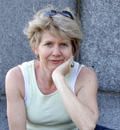
Postdoctoral fellow 2007-2008, Centre de recherche en éthique de l’Université de Montréal (CRÉUM)
Concordia University
Dr. Fawcett’s post-doctoral work looks at how improvised moments, as theorized from the perspective of experimental jazz, impact personal transformation and the creation of wider social networks at l’Abri en Ville – a Montréal-based, community-supported, mental health housing initiative. Focusing in on the kinds of home-based relational improvisations that are undertaken daily (and often under great duress) by and between L’Abri residents and volunteers, she uses a mix of site-based interviews and ethnographic interventions to explore the nature and place of ‘risk’ in an environment where stability is such an essential component of living well, both personally and communally. This critical interplay between staying in control and falling out of control was equally central to her doctoral research, which looked at how gender and affect play themselves out in the context of the public recreational ice-skating scene. Introducing into this bladed world the figure of the swaggering midlife female trick-skater, she used this destabilizing entity to probe what it means for aging female bodies to ‘become’ movement through a participation in ‘alternative’ sporting activities. Ever interested in how we write the body in all its motile glory into academic texts, Dr. Fawcett draws on feminist and poststructuralist philosophy to explore more visceral and sentient ways of conveying, through writing, the complex communications involved in our daily engagements with improvisatory practices and community relations. She holds a PhD in Communication Studies and an MA in Media Studies from Concordia University, and a BA in Communication Studies.


